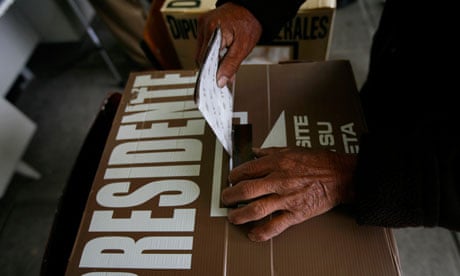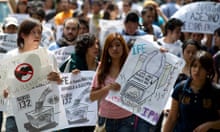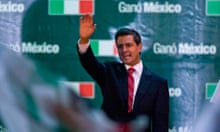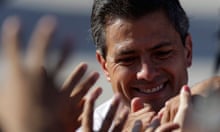Mexicans go to the polls to elect their new president on Sunday with the candidate of the once-vilified Institutional Revolutionary party, known as the PRI, the clear favourite to win.
Young, telegenic and impeccably smooth, Enrique Peña Nieto has helped the party gloss over a reputation for corruption and periodic authoritarianism accrued over 71 uninterrupted years in power that ended in 2000 when it lost the presidency to the National Action party (PAN).
"The change of party in government was not good" said Cristián Marquéz, a PRI voter in Mexico City. "The PRI has learned from the mistakes it made towards the end [of the regime] and it is still the only party that knows how to govern."
Such voices are rare in the capital, a bastion of support for Andrés Manuel López Obrador of the leftwing Party of Democratic Revolution. Most national polls, however, show him trailing the leader by double digits.
"The polls are manipulated," said receptionist and López Obrador supporter María Guadalupe García. "If the PRI wins it will be because of the party machine that takes advantage of the poverty and ignorance of the people, rather than an informed and reasoned vote."
In recent weeks López Obrador has filled his speeches with assumptions of victory, leading to accusations from the PRI that he is preparing to contest a loss. His refusal to accept a wafer-thin defeat to Felipe Calderón of the PAN at the last presidential election in 2006 sparked a prolonged post-election crisis.
Now the PAN is in a similar predicament to the PRD, with its candidate, Josefina Vázquez Mota, in third place in most polls. The PAN has suffered from public frustration at the party's 12 years in power, first under President Vicente Fox and then under Calderón, marked by rampant drug war violence and sluggish economic growth in a country where about half the population live in poverty.
"I don't particularly like her, but I don't want our country to go backwards to the PRI and I don't trust López Obrador" said PAN voter Fabiola Torres. "The [probable] return of the PRI does not frighten me but it does make me angry at the thought that we changed things for nothing."
As well as choosing a president for a single six-year term (the constitution bans re-election), Mexico's 79 million electorate will renew the upper and lower houses of the national congress. There are also six governorship races, the election for the mayor of Mexico City, and hundreds of other local offices on the ballots of the country's 143,151 polling stations.
Electoral officials insist the fairness of these elections is guaranteed, and most observers recognise that the days are over when ballot boxes were crudely stuffed and the frontrunner in the presidential count switched after a mysterious power failure.
Allegations of vote-buying are nevertheless widespread, particularly directed at the PRI and its legendary party machine.
Both the PAN and the PRD have accused the PRI of stockpiling gift cards ready to be exchanged for votes. The old party of power has countered that its rivals are merely preparing to question the legitimacy of its victory.
While most polls give Peña Nieto a commanding lead, some observers stress that much depends on who actually turns out to vote.
A low turnout is expected to favour the PRI and its machine. Some suggest a high turnout, particularly a surge in normally apathetic young voters, could help López Obrador, who is presumed to be the biggest beneficiary of the eruption of an anti-Peña Nieto student-led movement in May.
The student movement, also focused attention on alleged media bias in favour of the leader – backed by recent revelations in the Guardian – shook up what had been a rather dull campaign. It did not, however, appear to have a major impact on pre-election opinion polling.





